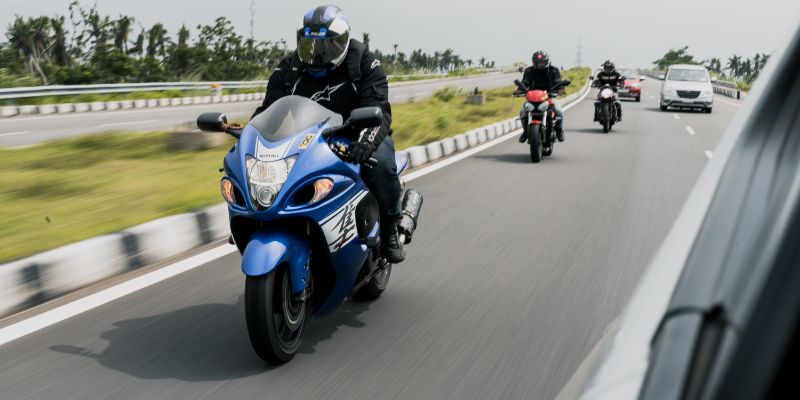904-309-6500Call Us today for Help

Motorcyclists face several risks on the road due to motorcycles’ lack of safety features compared to enclosed passenger vehicles and their small size, which makes them less visible than larger vehicles. Conversely, motorcycles are smaller, more agile, and have greater acceleration than many standard passenger vehicles, which makes them highly maneuverable in certain situations. While this is claimed to be advantageous in some ways and may even help prevent motorcycle accidents, unfortunately, the maneuverability of motorcycles often encourages riders to engage in risky behaviors around other vehicles.
Lane splitting is a term to describe a motorcycle passing between lanes of adjacent slower-moving traffic. The motorcyclist rides the white line between the lanes of traffic to pass the slower-moving vehicle around them. This practice is often conflated with lane sharing, which describes two vehicles riding side-by-side in the same lane of traffic. White-lining or lane splitting is sometimes claimed to improve motorcyclist safety by allowing them to escape potentially dangerous situations. Some proponents of the practice claim it enables a more efficient flow of traffic.
The reality is that lane splitting is inherently dangerous for several reasons. Most states have outright banned the practice, Florida included. If you ride a motorcycle in the state, it is vital to know that lane splitting is illegal and can lead to legal penalties if you are caught performing this maneuver.
Understanding the Dangers of Lane Splitting
Drivers throughout the United States are expected to operate their vehicles responsibly and attentively at all times. Lane splitting is a point of contention in many places throughout the United States because many motorcyclists believe the practice can help them stay safe in certain situations. For example, if a driver is bearing down on them from behind, lane splitting allows them to escape a potentially dangerous situation. However, opponents of the practice raise numerous concerns about lane splitting, and state lawmakers have decided that the risks outweigh any potential benefits and have banned the practice.
When a motorcyclist splits a lane, the drivers they pass may become startled. They might swerve as a reflex, colliding with guard rails or other vehicles. They could also lose control of their vehicle and cause a serious accident. It is also possible for a motorcyclist to misjudge the space they have to split a lane, resulting in a sideswipe collision. The motorcyclist will also need to move faster than the other vehicles around them, and they may speed past slower-moving traffic but be unable to slow down to adjust for the traffic conditions ahead of them.
Motorcycle accidents may be less common than other motor vehicle accidents, but this is only due to the fact that there are fewer motorcycles on the road than other vehicles. When motorcycle accidents do happen, they tend to result in far worse injuries than most passenger vehicle accidents. Statistically, motorcycle accidents have a much greater chance of causing fatal injuries than all other types of accidents.
If you ride a motorcycle in the state, it is vital to recognize the dangers you face on the road. Land splitting is one such danger. Not only is it dangerous in several ways, but even if you complete the maneuver successfully, you may still face a traffic ticket if a police officer sees you split a lane.
FAQs
Q: Why Is Lane Splitting Illegal?
A: Florida lawmakers have banned lane splitting, citing the fact that the practice can potentially increase the risk of serious motorcycle accidents. When a motorcycle splits the lane, it can startle the drivers on either side of them, potentially causing them to swerve. Drivers don’t usually expect to see lane splitting motorcyclists, so if a driver changes lanes in front of a lane splitting motorcyclist, it could easily result in a devastating motorcycle accident.
Q: What Are the Penalties for Lane Splitting?
A: Lane splitting is a traffic violation typically punished by a fine. Fines can vary based on location, and most fines are between $100 and $500. However, if the motorcyclist caused an accident from lane splitting, they could face additional penalties. They may also owe punitive damages to the victim in addition to their other losses due to causing an accident through breaking the law.
Q: Is Lane Sharing Legal?
A: Two motorcyclists are allowed to ride side-by-side in Florida. Lane sharing in this manner can potentially make the riders more visible to other motorists, especially at night. However, a motorcyclist may not share a lane with any other vehicle. Motorcyclists are advised to only share lanes at reasonable speeds and only when it appears safe to do so.
Q: How Do I Prove Fault for a Motorcycle Accident?
A: Many types of evidence could be essential to your recovery efforts from a motorcycle accident. Testimony from witnesses and others involved in the accident is often vital, and it is also possible to secure vehicle computer data, traffic camera footage, and cell phone records if necessary. If a motorcyclist splits a lane and causes an accident, they are likely to face liability for the resulting damages.
Q: How Do I Recover Compensation for a Motorcycle Accident?
A: Filing an insurance claim is typically the first step in recovering from any motor vehicle accident. All drivers must use their own insurance to pay for their damages under Florida’s no-fault rule. However, you could file a personal injury claim against the driver who caused your recent accident if insurance cannot cover your damages and they are clearly to blame for the accident.
Spohrer Dodd Trial Attorneys routinely represents injured clients throughout the state who have experienced all types of motor vehicle accidents, including lane sharing accidents and all types of motorcycle crashes. Whatever your case entails, you can rely on our team to guide you through the recovery process and help secure compensation for your damages. Contact us today to schedule a free consultation with our firm and learn more about how we can assist with your recovery.

